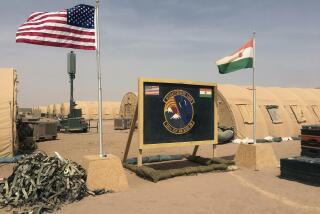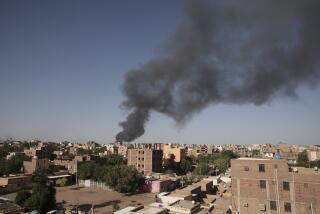U.S. Troops Move Inland in Somalia : Relief: Takeover of deserted airstrip marks first major foray into country’s central region. Help is one step closer to aid workers in Baidoa.
- Share via
BELA DOGLE, Somalia — In an important advance that brought Operation Restore Hope closer to Somalia’s starving millions, more than 600 U.S. Marine, Air Force and Army troops took over an abandoned inland airstrip here Sunday and created the first permanent base on the edge of the nation’s famine zone.
The troops arrived at the former Soviet base, set amid thickets of thorny acacia trees, in wave after wave of helicopters watched solemnly in flight by curious farmers and herds of camels.
“This is just one more step to get away from the (Mogadishu) port and move out into the hinterland,” said Air Force Brig. Gen. Thomas R. Mikilojcik, the Charleston, S.C.-based commander of the operation. “Each step forward is important.”
The occupation, welcomed by smiling town elders, marked the first major U.S. foray into central Somalia. Earlier, Air Force specialists guarded by Army Special Forces had worked to put the runway and control tower in shape for Sunday’s takeover.
The operation brought U.S. forces closer to an all-important advance into Baidoa, 80 miles away, the center of a region where more than 150 people are dying daily of starvation.
In recent days, relief workers in that lawless Somali city have pleaded with U.S. commanders to bring troops quickly to restore order and halt a sharp rise in looting and threats on relief agency compounds. Food flights to the city have been disrupted, and relief officials say it appears that armed bands, many driven from the capital of Mogadishu by the new Marine presence there, are staging a last-minute offensive to pillage the city before the U.S. troops take over.
Military officials declined Sunday to reveal their plans for taking Baidoa, although they have said it could occur within a week.
“We’re working as hard as we can to get to Baidoa,” said Lt. Gen. Robert B. Johnston of Camp Pendleton, the commander of Operation Restore Hope. “We have a plan and we’ll get there pretty darn fast.”
But, Johnston added, “I want to make sure I have the forces I need to enforce security there and to be able to respond to any circumstances we find. I’m not going to go there just wishing that, by luck, it’ll be quiet.”
The military buildup, with a goal of 28,000 troops, continued Sunday in Mogadishu, with regular planeloads of soldiers, trucks and supplies landing at the airport. Troop trucks loaded with Marines shuttled from the airport to their stronghold at the former U.S. Embassy. For the second straight day, a Marine-escorted food convoy peacefully crossed the Green Line that until Saturday had divided the city into territories ruled by rival clans.
And an oceangoing cargo ship, the Sea Pearl, loaded with 3,000 tons of wheat, docked under Marine guard at the Mogadishu harbor--the first relief ship to reach the country in nearly two months. Four more ships, with 30,000 tons of food, are bound for the port.
However, the capital that had been virtually free of guns since the Marine landing last Wednesday took a worrying step backward and became a much more dangerous place Sunday.
With street robberies on the rise, Marine commanders had told U.N. relief officials Saturday that, while large-caliber weapons were forbidden, their vehicles could resume carrying light automatic weapons for protection. On Sunday, the city was filled with pickup trucks armed with AK-47 and M-16 assault rifles, careening through the crowded streets alongside Marine patrols.
And armed guards were posted outside most residential compounds and marketplaces.
“We are not the police force of Somalia,” said Marine spokesman Lt. Col. Fred Peck. “We’re not attempting to disarm Mogadishu or any other city.”
Instead, he said, the U.S. mission is to restore just enough security in the major cities to allow relief food to reach starving Somalis. Until Sunday, though, the Marines had been manning roadblocks, often--but not always--searching for and confiscating weapons.
Those roadblocks were replaced for the first time Sunday by single-vehicle patrols, often with two French soldiers in the front and two Marines in the back. On one street, two Marines in an open Humvee hopelessly locked in a traffic jam fished 35-millimeter cameras from their pockets to photograph the city and its smiling residents.
Members of a foot patrol through ravaged central Mogadishu, known here as the “Bermuda Triangle,” ducked at one point when a single sniper shot cracked from a nearby building.
In Bela Dogle, about 60 miles northwest of the capital, helicopters brought 230 Marines and a few Air Force troops to take over the airport. A mobile communications unit set up shop in the gutted and looted control tower.
“I’m trying to think of the right word,” said Marine Warrant Officer Mike Hedlund. “ ‘Seized’ wouldn’t be right. Occupied. That’s it. We occupied the airport.”
Those troops were followed by 450 soldiers from the Army’s 10th Mountain Division, who had boarded a plane in a driving snowstorm near Ft. Drum, N.Y., on Saturday and were dumped nearly 24 hours later at this remote spot under a hot, equatorial sun.
“I hope I can help these people a little bit,” said Army Sgt. Gary Goss of McLean, Va. “It will be nice to get everything back to normal here.”
Like many of the soldiers, Goss was surprised that the region was so green. “I thought it would be more like the desert,” he said.
Crops have been planted here, and the rains have been good in recent weeks. If the good weather continues, and Somalis are able to work the fields without fear of robbery, the January harvest could begin to ease the famine, relief officials said.
Sunday’s mission originally was to be a helicopter assault on the airfield, followed by an extensive search of airport buildings and surrounding bush county. But, at the last minute, it was downgraded to a less-provocative “helicopter insert” when Marines learned that local town elders were welcoming the troops’ arrival and had agreed to voluntarily clear out of the area surrounding the airport.
But the difficulty that U.S. forces face in restoring peace to this war-torn land, which has no functioning government, was evident a few hours later. The Marines said the local leaders had agreed to turn in some of their arms, but only if the Americans brought food. So, Marine commanders loaded 30 100-pound bags of French rice to exchange in an afternoon meeting to which the media were invited.
The elders--all colonels in the militia controlled by clan leader Mohammed Farah Aidid--arrived promptly. They were plainly excited to meet the Marines. But they hadn’t brought any guns to exchange for food.
“We are here to restore hope,” Maj. Robert R. Parker Jr. told them. “We have food for anyone who wants it. Just bring your guns.”
“We want to welcome you and help you in your work,” one of the colonels said. “But Gen. Aidid is our leader and as soon as we get an order from him we will do as we’re told.”
Instead, they asked for jobs. Parker said he couldn’t offer them jobs. But he said that new jobs in the country “would happen in due course.”
A day before, an Army Special Forces unit on a reconnaissance mission spotted a gun in a car on the road passing the airport entrance. They stopped the car, confiscated the weapon, and began to search other cars. In the next 10 minutes, they collected 15 rifles.
One of Aidid’s commanders, a gaunt 50-year-old named Ahmed Elmi Gutu, said Sunday that his militia was pleased to see the American troops at Bela Dogle.
“The Somali people are glad to see the Marines collecting these weapons,” Gutu said. “The Americans’ only intent is to have no hard feelings.”
Times staff writer Mark Fineman in Mogadishu contributed to this report.
More to Read
Sign up for Essential California
The most important California stories and recommendations in your inbox every morning.
You may occasionally receive promotional content from the Los Angeles Times.














